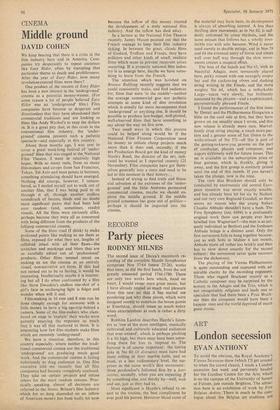CINEMA
Middle ground
DAVID COHEN
We keep hearing that there is a crisis in the film industry here and in America. Com- panies try desperately to repeat successes like Easy Rider, often by trampling that particular theme to death and profitlessness. After the year of Easy Rider, how many revolution-centred films were there?
One product of the success of Easy Rider has been a new interest in the 'underground' cinema as a potential money-winner. (For some reason a lot of people believed Easy Rider was an 'underground' film.) Film companies have become so desperate and directionless that they have abandoned their commercial traditions and are looking to films like Andy Warhol's to reap the dollars in. It is a great pity that, at this crisis in the conventional film industry, the 'under ground' cinema presents such a pathetic spectacle—and especially in this country.
About three months ago, I was sent to cover a great week-long festival of 'under- ground' films that was staged at the National Film Theatre. I went in relatively high hopes. With so many reels, from so many film-makers and co-ops from San Francisco, Tokyo, Tel Aviv and most points in between, something stimulating should have emerged. Nothing did emerge, however. I remem- bered, as I steeled myself not to walk out of another film, that I was being paid to sit through it all, through another endless soundtrack of buzzes, thuds and no doubt most significant pants that had been laid over random (and, sometimes, randy) visuals. All the films were curiously alike, perhaps because they were all so concerned with being different from the products of the lollipop commercial cinema.
Some of the films tried (I think) to make. profound points like making us see them as films, exposed for what they are, lengths of celluloid intact with all their flaws—the scratches and markings and blurs that are so carefully edited out of 'professional' products. Other films seemed intent on making us see the cinema as an entirely visual, non-narrative art form. If this had not turned out to be so boring, it would be interesting. Intellectually maybe it is interest- ing but all I do when confronted by a film like Steve Dwoskin's. endless one-shot of a girl's face in unchanging light is fidget and wonder when will it end.
Film-making in 16 mm and 8 mm can be done cheaply enough for someone with a little money to have a big ego-trip behind a camera. Some of the film-makers who clam- bered on stage to 'explain' their works were patently enjoying the exposure so much that it was all that mattered to them. It is interesting how few film students make films which are remotely 'underground'.
We have a situation, therefore, in this country especially, where neither the tradi- tional commercial cinema nor the traditional 'underground' are producing much good work. And the commercial cinema is failing notoriously to drag audiences in. One film executive told me recently that all film companies had become completely confused.
They take on certain projects and refuse others for the most random reasons. Prac- tically speaking, almost all decisions are referred to the States. Britain's film industry which for so long depended on an inflow of American money has been badly hit now because the inflow of this money stunted the development of a truly national film industry. And the inflow has died away.
In a lecture at the National Film Theatre recently, James Mason pointed out that the French manage to keep their film industry ticking. In between the great, classic films of Godard, Truffaut and Franju, they have policiers and other kinds of small, realistic films which seem to prevent recurrent crises occurring. If a properly national film indus- try is to emerge here, maybe we have some- thing to learn from the French.
The attention which was lavished on Bronco Bullfrog recently suggests that we could consistently make, and find audiences for, films that were 'in the m'iddle'—neither the average commercial goo nor pathetic attempts at some kind of dim revolution which is usually far more incompetent than 'underground' or anything else. It should be possible to produce low-budget, well-plotted, well-observed films that have something to say about the way we live now.
Two small ways in which this process could be helped along would be if the National Film Finance Corporation used its money to initiate cheap projects much more than it does and, secondly, if the BFI Production Board got the kind of money Stanley Reed, the director of the BFI, indi- cated he wanted as I reported recently (21 November). Film companies have got them- selves generally into a mess and need to be led at this moment in their history.
Instead of trying to find truth and finan- cial salvation at the extremes of the 'under- ground' and the Julie Andrews permeated commercial cinema, maybe we should ex- plore the middle ground. If the middle ground consensus has gone out of politics— perhaps it should be imported into the cinema,










































 Previous page
Previous page